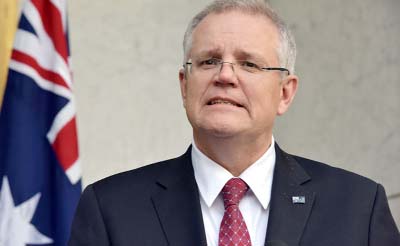
AFP, Washington :
The top commander for US and NATO forces in Afghanistan said Wednesday that warring parties now have an “unprecedented” opportunity for peace, and insisted President Donald Trump’s strategy for the beleaguered country is working.
General John Nicholson, the outgoing commander of NATO’s Resolute Support mission, spoke to Pentagon reporters a year after Trump unveiled his Afghanistan strategy, which increased the US troop presence and now includes a renewed push to bring the Taliban to the negotiating table.
“We have an unprecedented opportunity, or window of opportunity, for peace right now,” Nicholson said.
Despite a wave of violence that has rocked Afghanistan and its capital Kabul in recent weeks, killing scores of civilians and Afghan security forces, Nicholson said he was seeing signs of hope.
“There’s been progress on the peace process,” he said, pointing to a short ceasefire in June, the first since the US-led invasion in 2001 that toppled the Taliban regime.
On Sunday, Afghanistan President Ashraf Ghani unveiled another ceasefire offer, saying security forces would observe the truce beginning this week-but only if the militants reciprocated.
“So far we’ve not heard if the Taliban will accept or reject this ceasefire,” Nicholson said.
The June ceasefire spurred hopes that a new path was opening for possible peace talks.
The Taliban have long insisted on direct talks with Washington and refused to negotiate with the Afghan government, which they see as illegitimate.
In June, Washington indicated a change in its longstanding policy, with US officials meeting Taliban representatives in Doha in July.
But Nicholson stressed that any peace talks must ultimately be “Afghan-led, Afghan-owned.”
“The US is prepared to support, facilitate and participate in these discussions,” he said.
This month has seen an extraordinarily violent series of events including an attack that saw the Taliban storm the provincial capital of Ghazni-just a two-hour drive from Kabul.
Militants held large parts of the city for days and Afghan forces needed US air power to push them back.
But Western officials point to such attacks as showing that the Taliban is actually struggling, because they are unable to hold ground for long.
Though Nicholson said Trump’s Afghanistan strategy is working, he acknowledged the increased influence of terror groups including the Islamic State group.
“With respect to ISIS, that is a concern,” he said.
“ISIS did not exist in Afghanistan three years ago, so it is a new dynamic.”
Nicholson is being rotated of Afghanistan after serving more than two years.
The top commander for US and NATO forces in Afghanistan said Wednesday that warring parties now have an “unprecedented” opportunity for peace, and insisted President Donald Trump’s strategy for the beleaguered country is working.
General John Nicholson, the outgoing commander of NATO’s Resolute Support mission, spoke to Pentagon reporters a year after Trump unveiled his Afghanistan strategy, which increased the US troop presence and now includes a renewed push to bring the Taliban to the negotiating table.
“We have an unprecedented opportunity, or window of opportunity, for peace right now,” Nicholson said.
Despite a wave of violence that has rocked Afghanistan and its capital Kabul in recent weeks, killing scores of civilians and Afghan security forces, Nicholson said he was seeing signs of hope.
“There’s been progress on the peace process,” he said, pointing to a short ceasefire in June, the first since the US-led invasion in 2001 that toppled the Taliban regime.
On Sunday, Afghanistan President Ashraf Ghani unveiled another ceasefire offer, saying security forces would observe the truce beginning this week-but only if the militants reciprocated.
“So far we’ve not heard if the Taliban will accept or reject this ceasefire,” Nicholson said.
The June ceasefire spurred hopes that a new path was opening for possible peace talks.
The Taliban have long insisted on direct talks with Washington and refused to negotiate with the Afghan government, which they see as illegitimate.
In June, Washington indicated a change in its longstanding policy, with US officials meeting Taliban representatives in Doha in July.
But Nicholson stressed that any peace talks must ultimately be “Afghan-led, Afghan-owned.”
“The US is prepared to support, facilitate and participate in these discussions,” he said.
This month has seen an extraordinarily violent series of events including an attack that saw the Taliban storm the provincial capital of Ghazni-just a two-hour drive from Kabul.
Militants held large parts of the city for days and Afghan forces needed US air power to push them back.
But Western officials point to such attacks as showing that the Taliban is actually struggling, because they are unable to hold ground for long.
Though Nicholson said Trump’s Afghanistan strategy is working, he acknowledged the increased influence of terror groups including the Islamic State group.
“With respect to ISIS, that is a concern,” he said.
“ISIS did not exist in Afghanistan three years ago, so it is a new dynamic.”
Nicholson is being rotated of Afghanistan after serving more than two years.

